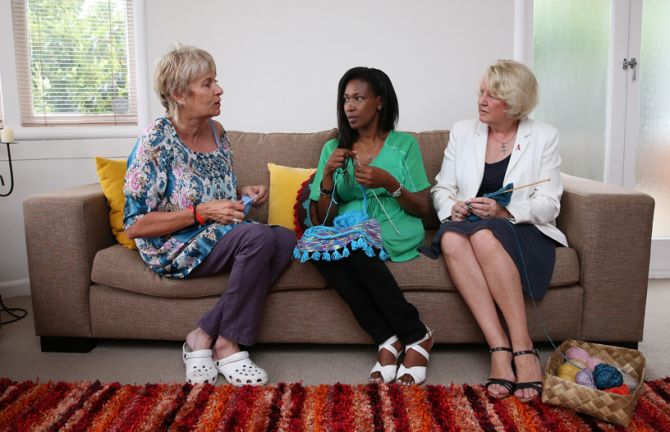

Feature Story
Women living with HIV in New Zealand talk about stigma
09 March 2015
09 March 2015 09 March 2015In the lead up to International Women’s Day, UNAIDS Deputy Executive Director Jan Beagle joined a group of women living with HIV in Auckland, New Zealand, to hear about their experiences. The meeting was one of the regular meetings of Positive Women, a support organization for women living with HIV and their families. The group works on raising awareness of HIV in the community through educational and anti-stigma programmes.
Jane Bruning, National Coordinator of Positive Women Inc. said, “Living with HIV can be very isolating as many women don’t want to tell anyone about their status. So it’s extremely important to have a safe space where women can gather and speak openly without fearing they will be judged.”
Ms Beagle, who is originally from Auckland, said she was touched by the women’s stories. “I’ve visited women living with HIV in many countries, but it is special to hear from women living with HIV in my own country. I am moved by their stories and I am committed to work with them to address the stigma and discrimination that is so much a part of their daily lives.”
The women told Ms Beagle about their fear of disclosing their status publicly. Their reasons were often different. For some, there was concern over losing their employment, while others were worried their children would be ostracized because their mother is living with HIV.
Judith Mukakayange, who is now open about her status, said she came to New Zealand 15 years ago as a refugee, fleeing civil war in Rwanda. When she arrived she was overjoyed to start a new life. However, that dream quickly crumbled when as part of her application process to emigrate she took an HIV test and learned that she was HIV-positive. “When you hear you have HIV you feel so isolated, so it’s important to connect to other people who understand you,” said Ms Mukakayange.
“I have this story that I don’t tell anybody. Even my close friends don’t know. I just can’t say I have AIDS. It’s awkward, awkward, awkward. Coming here to Positive Women is great. I can’t imagine life without Positive Women,” another woman at the meeting said.
From the early days of the AIDS epidemic, New Zealand has taken a lead in the response. The country implemented evidence-informed programmes to ensure that key populations at higher risk of acquiring HIV received priority attention. In 1987, New Zealand was among the first countries to introduce needle exchange programmes for people who use drugs. It was also a regional pioneer in decriminalizing sex work and sex between men.
These initiatives are widely credited with having curbed the epidemic in the country. New Zealand has a very low HIV prevalence, with the Ministry of Health reporting around 0.1% of adults aged 15 to 49 living with HIV. In 2013, around 180 people were newly diagnosed with the virus.
However, despite this progress, people living with HIV still face stigma and discrimination. A recent survey conducted by local AIDS organizations found that 50% of people surveyed would be uncomfortable having food prepared by someone living with HIV.
Of Positive Women Ms Bruning said, “We may be a small organization but we punch well above our weight. I am proud of what we do.”



